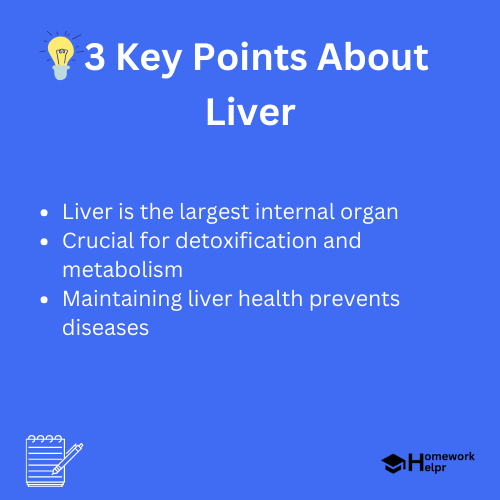📝 Summary
The liver is a vital organ in the human body that plays a crucial role in maintaining health. Located in the upper right abdomen, the liver, weighing approximately 3 pounds, consists of specialized cells called hepatocytes. The liver performs multiple functions, such as detoxification, metabolism, storage of nutrients, and synthesis of proteins. Maintaining liver health is essential and can be supported by a healthy diet, regular exercise, and avoiding excessive alcohol consumption. Liver diseases like hepatitis and cirrhosis can pose significant health risks, making early diagnosis and intervention essential for overall well-being.
The Marvelous Liver: An Essential Organ
The human body is home to many vital organs, but few are as important as the liver. This remarkable organ plays a critical role in maintaining the overall health and functionality of the body. In this article, we will explore the anatomy, function, and significance of the liver, making it a fun and informative read for students and children alike.
Anatomy of the Liver
The liver is the largest internal organ in the human body and is located in the upper right side of the abdomen. It is a reddish-brown organ, shaped like a wedge, and weighs approximately 3 pounds in adults. The liver is divided into two main lobes, which are further divided into smaller lobes called lobules.
The liver is made up of specialized cells known as hepatocytes, which perform various functions to keep the body healthy. Blood flows into the liver from two primary sources: the hepatic artery and the portal vein. The hepatic artery carries oxygen-rich blood from the heart, while the portal vein brings nutrient-rich blood from the digestive tract.

Functions of the Liver
The liver is often referred to as the body’s “chemical factory” due to the myriad of functions it performs. Here are some of its key responsibilities:
- Detoxification: The liver filters out harmful substances from the blood, including alcohol, drugs, and environmental toxins.
- Metabolism: It plays a crucial role in converting nutrients from the food we eat into energy, helping to maintain stable blood sugar levels.
- Storage: The liver stores important vitamins, minerals, and glycogen, a form of stored glucose that can be converted into energy when needed.
- Synthesis of Proteins: Liver cells produce vital proteins such as albumin, which is essential for maintaining blood volume and pressure.
Understanding these functions highlights just how vital the liver is to our overall well-being. When the liver performs optimally, it helps the body function smoothly.
Definition
Detoxification: The process of removing toxic substances or qualities from the body. Hepatocyte: The main functional cell of the liver, responsible for various metabolic functions. Metabolism: The sum of all chemical reactions in the body that maintain life, including converting food into energy.
The Importance of Liver Health
Maintaining a healthy liver is essential for overall wellness. Many factors can affect liver health, including diet, exercise, alcohol consumption, and medications. Some key points to consider for keeping your liver healthy include:
- Healthy Diet: Consuming a balanced diet rich in fruits, vegetables, whole grains, and lean proteins helps support liver function.
- Regular Exercise: Physical activity helps reduce fat buildup in the liver, lowering the risk of liver diseases.
- Avoiding Excessive Alcohol: Limiting alcohol intake is crucial, as excessive consumption can lead to liver damage and diseases such as cirrhosis.
- Hydration: Drinking plenty of water assists the liver in flushing out toxins effectively.
💡Did You Know?
The liver is capable of regenerating itself! Even if up to 75% of the liver is removed, it can grow back to its original size in a few months.
Liver Diseases and Their Impact
Despite its incredible resilience, the liver can be susceptible to various diseases. Common liver disorders include:
- Hepatitis: An inflammation of the liver caused by viral infections, excessive alcohol consumption, or certain medications.
- Cirrhosis: Severe scarring of the liver usually resulting from long-term liver damage, leading to loss of function.
- Fatty Liver Disease: A condition characterized by excess fat build-up in the liver, often associated with obesity and metabolic disorders.
These conditions can significantly affect health, leading to symptoms such as fatigue, jaundice (yellowing of the skin and eyes), and abdominal pain. Early diagnosis and intervention are essential for managing liver health.
Definition
Cirrhosis: A late-stage liver disease in which the liver becomes severely scarred and loses its function. Hepatitis: An inflammatory condition of the liver, often caused by viral infections or toxic substances. Jaundice: A medical condition characterized by yellowing of the skin and eyes due to high levels of bilirubin in the blood.
Conclusion
In conclusion, the liver is a remarkable organ that performs an array of functions essential for sustaining life and health. Its ability to detoxify, metabolize nutrients, synthesize proteins, and store important substances makes it truly indispensable. As students, understanding the importance of liver health and taking steps to maintain it can lead to a lifetime of well-being. By making informed choices regarding diet, exercise, and avoiding harmful substances, you can contribute to the health of this marvelous organ.
So remember, your liver works hard for you every day-let‚’ return the favor by keeping it healthy!
Related Questions on Liver
What role does the liver play in detoxification?
Answer: The liver filters harmful substances from the blood, such as alcohol and drugs.
What can I do to maintain liver health?
Answer: A balanced diet, regular exercise, and avoiding excessive alcohol are key ways to maintain liver health.
What are common liver diseases?
Answer: Common liver diseases include hepatitis, cirrhosis, and fatty liver disease.
Can the liver regenerate itself?
Answer: Yes, the liver has a remarkable ability to regenerate even after significant damage, regaining its original size over time.
